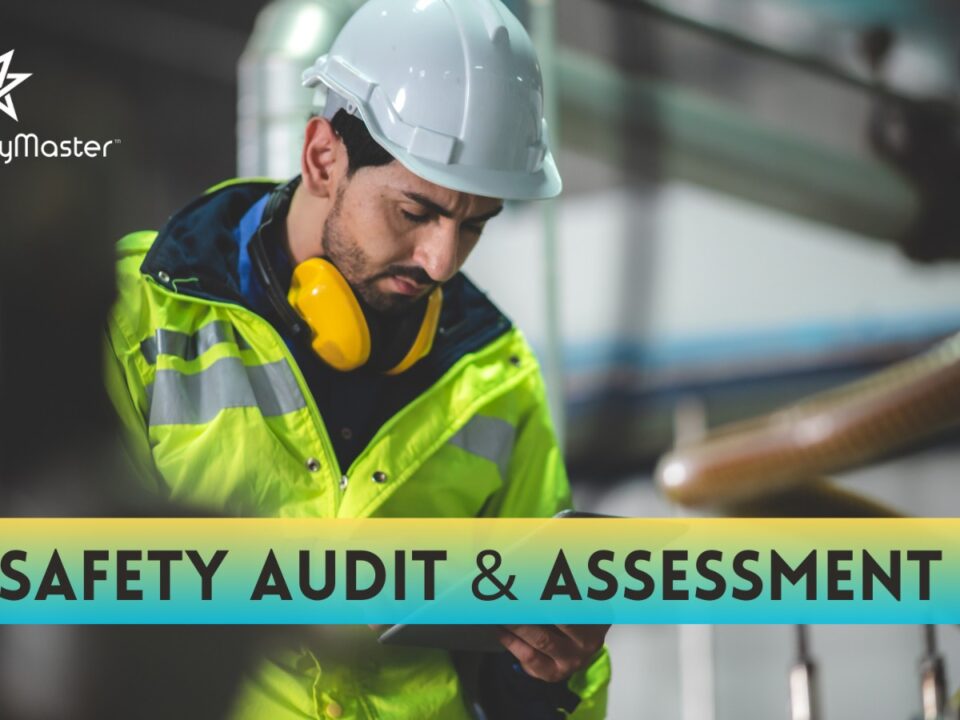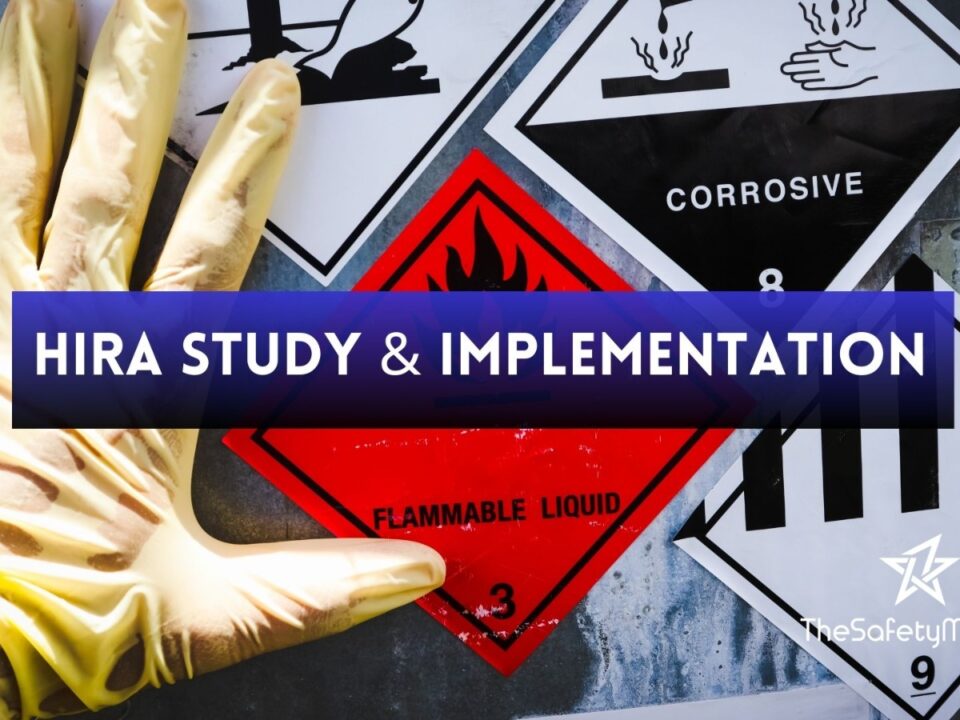A Step Towards Sustainable Growth: How Safety Audits Foster Industry Development in India

Unveiling the Hidden Fire Hazards – How Regular Audits and Assessments Can Save Businesses
March 11, 2025
The 5 Key Steps for a Successful Behavior Based Safety Implementation Process in the Workplace
March 13, 2025In this article, we delve into a critical aspect of India’s industry development that often goes unnoticed – safety audits. As the nation strives for sustainable growth, ensuring the safety and well-being of workers and the environment becomes paramount. But how do safety audits contribute to this objective? Brace yourself for an eye-opening exploration where we shed light on the importance of these audits, reveal their impact on industry development, and provide valuable insights for businesses seeking to enhance their operations in India. Discover how embracing safety can pave the way for a prosperous and sustainable future. Your journey to industry excellence starts here.
Introduction
In today’s rapidly evolving world, the pursuit of sustainable growth has become a paramount concern for nations across the globe. As industries continue to expand and progress, it is crucial to ensure that this development does not come at the expense of safety and environmental well-being. This is especially true for a country like India, which has been experiencing remarkable industrial growth in recent years. Amidst this backdrop, safety audits have emerged as a vital tool for fostering industry development in India. These audits serve as an effective means to assess and monitor safety measures adopted by various industries, ensuring compliance with regulations and promoting a culture of workplace safety. By doing so, safety audits not only safeguard the workforce but also enhance efficiency, mitigate risks, address environmental concerns, and ultimately contribute towards sustainable growth
Understanding Safety Audits in Industry Development
Safety audits are a crucial aspect of industry development in India, where sustainable growth is prioritized. These audits involve a systematic examination and evaluation of workplace safety practices, ensuring compliance with regulatory standards and identifying potential risks. By understanding safety audits in the context of industry development, we can appreciate their significance in fostering a conducive environment for growth. Safety audits play a vital role in mitigating workplace hazards, reducing accidents, and promoting the well-being of employees. Through comprehensive inspections and assessments, industries can identify areas for improvement and implement necessary measures to prevent accidents or injuries. This proactive approach not only safeguards the workforce but also enhances productivity by minimizing disruptions caused by workplace incidents. Additionally, it instils confidence among employees that their safety is paramount to the organization’s success.
Furthermore, safety audits assist industries in staying up-to-date with evolving safety regulations and standards. Compliance with these measures not only ensures the welfare of workers but also strengthens stakeholder trust. Adhering to stringent safety protocols demonstrates commitment towards responsible business practices, thereby enhancing the reputation of companies both domestically and internationally. Moreover, an industry that prioritizes employee well-being is more likely to attract top talent and establish itself as a preferred employer – a definite competitive advantage.
In summary, understanding the importance of safety audits in industry development reveals their instrumental role in ensuring sustainable growth in India’s ever-expanding industrial landscape. From safeguarding employees’ welfare to promoting compliance with regulations and building stakeholder trust, these audits provide a solid foundation for progress while fostering an optimistic outlook towards healthier work environments and prosperous industries.
The Importance of Safety Audits in India’s Growing Industries
The Importance of Safety Audits in India’s Growing Industries: In the dynamic landscape of India’s growing industries, safety audits play a paramount role in ensuring sustainable development. These audits serve as a crucial mechanism for identifying and rectifying potential hazards, fostering a safe working environment, and protecting the well-being of employees. By conducting comprehensive safety audits, industries can mitigate risks and enhance operational efficiency while adhering to national and international safety standards.
Safety audits provide a holistic approach to risk management by evaluating various aspects, such as equipment maintenance, worker training programs, emergency response protocols, and compliance with legal obligations. Through this meticulous examination, potential hazards are identified early on and necessary measures are put in place to prevent accidents or mitigate their impact. This proactive approach not only safeguards the lives of workers but also minimizes disruptions to production processes, ultimately leading to increased productivity.
Moreover, safety audits contribute to building a culture of responsibility within industries by instilling a sense of accountability among stakeholders. When organizations prioritize the well-being of their workforce through regular safety audits, it fosters trust and commitment from employees towards the company’s mission. This sense of security translates into improved employee morale, job satisfaction, and overall organizational performance.
By recognizing that investment in safety is an investment in sustainable growth, India’s growing industries are bolstering their competitiveness on both domestic and international levels. Confidence in workplace safety attracts skilled talent who are more likely to join companies with strong safety records. Additionally, businesses that prioritize safety audits gain credibility among clients and investors who place emphasis on ethical practices.
Overall, the importance of safety audits cannot be overstated in India’s growing industries
Promoting Workforce Safety through Safety Audits
Promoting Workforce Safety through Safety Audits: Safety audits play a pivotal role in ensuring the well-being of a company’s most valuable asset – its workforce. By conducting regular safety audits, industries in India can identify potential hazards, assess risks, and implement effective safety measures to protect their employees. These audits involve thorough inspections of workplace environments, equipment, and processes to identify any gaps or areas for improvement.
A comprehensive safety audit not only focuses on physical safety but also considers psychological well-being in the workplace. By addressing factors such as ergonomics, proper training programs, and mental health support systems, companies can create a safe and conducive work environment that promotes employee satisfaction and productivity.
Moreover, promoting workforce safety through safety audits instils a sense of trust and loyalty among employees. When workers feel valued and protected by their employers’ commitment to maintaining high safety standards, it fosters a positive work culture where employees are motivated to perform at their best. Ultimately, prioritizing workforce safety not only reduces the risk of accidents but also leads to higher job satisfaction and retention rates among employees.
Mitigating Risks and Ensuring Compliance with Safety Standards
Mitigating Risks and Ensuring Compliance with Safety Standards: Within the realm of industry development, mitigating risks and ensuring compliance with safety standards is paramount. Safety audits provide a comprehensive framework to identify potential hazards and evaluate existing safety measures in industries across India. By conducting regular audits, companies can proactively address risks, minimize accidents, and safeguard the well-being of their workforce.
These audits encompass a meticulous assessment of safety protocols, equipment maintenance, training programs, and emergency preparedness. In doing so, industries can identify areas that require improvement and implement corrective measures to align with national and international safety standards. This not only fosters a culture of responsibility but also guarantees that all stakeholders are protected from potential harm or danger.
By prioritizing risk mitigation through safety audits, Indian industries demonstrate their unwavering commitment to ensuring the highest level of compliance with safety standards. This creates an optimistic environment where employees feel secure in their workplaces and investors gain confidence in the industry’s sustained growth. Ultimately, adherence to these standards not only protects lives but also contributes to a thriving industrial landscape that is poised for continued success on both national and global levels.
Enhancing Efficiency and Productivity through Safety Audits
Enhancing Efficiency and Productivity through Safety Audits: Safety audits play a pivotal role in enhancing efficiency and productivity within industries across India. By identifying potential hazards or inefficiencies in operational processes, safety audits enable companies to implement targeted improvements that streamline workflows and optimize resource allocation. Through the lens of safety, organizations can identify bottlenecks, eliminate unnecessary steps, and improve overall productivity.
Moreover, safety audits prompt a culture of continuous improvement within workplaces. By conducting regular assessments, companies foster an environment where employees are encouraged to suggest innovative ideas to enhance safety protocols while simultaneously boosting efficiency. This collaborative approach promotes employee engagement and empowers workers to take ownership of their roles in improving productivity.
Furthermore, safety audits allow organizations to assess equipment functionality and identify areas for optimization. By ensuring that machinery is operating at peak performance with regular maintenance checks, companies can minimize downtime due to breakdowns or repairs. This proactive approach not only increases efficiency but also saves valuable time and resources that can be redirected towards core business activities.
In essence, the integration of safety audits as a fundamental aspect of industry development cultivates an environment where efficiency is valued alongside employee well-being. This holistic approach generates a positive ripple effect by fostering a sense of pride among employees while creating sustainable growth opportunities for the entire industry ecosystem in India.
Addressing Environmental Concerns through Safety Audits
Addressing Environmental Concerns through Safety Audits: One of the key benefits of safety audits in industry development is their ability to address environmental concerns. As industries grow and expand, they often have a significant impact on the environment, including air and water pollution, deforestation, and waste generation. Safety audits provide a valuable opportunity to assess and mitigate these environmental risks.
By conducting comprehensive safety audits, industries can identify potential hazards that may harm the environment and take proactive measures to prevent or minimize them. This includes implementing effective waste management systems, adopting sustainable practices such as recycling and energy conservation, and ensuring adherence to environmental regulations.
In addition to reducing negative impacts on the environment, safety audits also foster innovation by encouraging industries to explore eco-friendly technologies and processes. This not only contributes to a healthier environment but also positions India’s industries as leaders in sustainability on a global scale. By embracing green practices through safety audits, businesses can demonstrate their commitment towards environmental stewardship while reaping long-term economic benefits.
Encouraging Innovation and Technological Advancements with Safety Audits
Encouraging Innovation and Technological Advancements with Safety Audits: In the ever-evolving landscape of industrial development, innovation and technological advancements are key drivers of sustainable growth. Safety audits play a crucial role in fostering an environment that encourages continuous improvement and breakthrough innovations. By incorporating safety considerations into the innovation process, companies can create a culture that values both creativity and risk management.
These audits provide an opportunity for industry leaders to evaluate their existing technologies and identify areas where innovative solutions can enhance safety measures. By conducting thorough assessments, companies can proactively identify potential hazards, devise efficient control mechanisms, and encourage the adoption of state-of-the-art technologies that mitigate risks. This not only ensures a safer work environment but also promotes the development of cutting-edge solutions that benefit both employees and consumers.
Moreover, safety audits serve as catalysts for collaboration between industry stakeholders and technology providers. By actively involving suppliers, manufacturers, researchers, and regulatory bodies in the audit process, a collective effort can be made to explore new avenues for technological advancements. Such collaborations often lead to novel breakthroughs in safety engineering, smart monitoring systems, automation processes, and predictive analytics – revolutionizing industries while safeguarding human lives.
By embracing safety audits as vehicles for fostering innovation and technological advancements, India’s industries can set themselves apart on the global stage. It is through this proactive approach that they will not only ensure compliance with international standards but also attract investments from countries seeking partnerships with responsible organizations committed to sustainable growth. Encouragingly, as industries blend innovation with meticulous safety practices through audits, they pave the way for a prosperous future where cutting-edge technologies coexist harmoniously with enhanced workplace well-being.
Fostering Stakeholder Confidence and Trust in Industry Development
Fostering Stakeholder Confidence and Trust in Industry Development: In the realm of industry development, one crucial aspect that cannot be overlooked is the establishment of stakeholder confidence and trust. Safety audits play a pivotal role in fostering this confidence by ensuring that all stakeholders, including employees, investors, customers, and the general public, have faith in the industry’s commitment towards safety and sustainability.
One-way safety audits accomplish this is by providing a transparent view of an organization’s safety performance. By conducting regular audits and sharing the results with stakeholders, industries demonstrate their dedication to identifying potential risks and taking proactive measures to mitigate them. This transparency not only builds trust but also instils a sense of security among stakeholders, generating positive perceptions about the industry’s commitment to their well-being.
Moreover, safety audits serve as a powerful tool for engaging stakeholders in the overall development process. By involving employees and other key individuals in identifying hazards or suggesting improvements during audit procedures, industries create a collaborative environment that empowers everyone to contribute towards safer practices. This inclusive approach not only boosts stakeholder morale but also encourages innovation and creativity within organizations.
By prioritizing stakeholder confidence through safety audits, industry development initiatives gain traction as they attract more investments from both domestic and international sources. Investors feel assured when they see industries actively managing risks through systematic evaluations. Likewise, customers tend to favour businesses that prioritize safety as it guarantees product quality and reliability.
Embracing safety audits as part of their operations helps industries foster long-term relationships built on trust with all stakeholders involved. As trust grows stronger over time, it paves the way for sustainable growth by attracting new opportunities for collaboration and expansion
Strengthening International Competitiveness through Safety Audits
Strengthening International Competitiveness through Safety Audits: With the global market becoming increasingly interconnected, ensuring international competitiveness is crucial for any industry. Safety audits play a vital role in this aspect by instilling confidence and trust in the minds of international stakeholders. By prioritizing safety, industries can demonstrate their commitment to ethical practices and protect their reputation on an international scale.
Safety audits provide a comprehensive evaluation of safety measures, helping industries identify areas for improvement and implement necessary changes. By consistently meeting or exceeding international safety standards, Indian industries can position themselves as reliable partners in global trade. This not only attracts foreign investors but also opens up avenues for collaborations and joint ventures, enhancing the overall growth and development of the industry.
Moreover, a strong emphasis on safety audits fosters innovation and technological advancements within Indian industries. As companies strive to meet and exceed safety standards, they are driven to develop new technologies that enhance workplace safety while improving operational efficiency. This innovative mind-set not only boosts productivity but also positions Indian industries as leaders in adopting cutting-edge practices that are sought after by international partners.
By strengthening international competitiveness through safety audits, India’s industries can contribute to sustainable growth while building a positive image on the global stage. Embracing a culture of safety not only protects workers’ well-being but also serves as a testament to India’s commitment towards responsible industry development. With increased trust from international stakeholders, Indian industries have the opportunity to expand their reach and contribute positively to both national and global economies.
Government Initiatives and Policies Supporting Safety Audits in India
Government Initiatives and Policies Supporting Safety Audits in India: The Indian government has recognized the paramount importance of safety audits in fostering industry development and has taken significant steps to support their implementation. In line with the country’s commitment to sustainable growth, various initiatives have been introduced to promote safety consciousness across different sectors.
One such initiative is the establishment of regulatory bodies like the National Safety Council (NSC) and the Directorate General Factory Advice Service & Labour Institutes (DGFASLI). These organizations work closely with industries, providing guidance, conducting training programs, and setting safety standards that must be adhered to during safety audits.
To incentivize companies to prioritize safety, the government offers tax benefits and grants for businesses that demonstrate a strong commitment towards implementing comprehensive safety audit protocols. Moreover, strict penalties are imposed on those who fail to comply with stipulated safety regulations. This robust regulatory framework not only ensures accountability but also serves as a catalyst for industry players to embrace safety as an integral part of their operations.
By actively promoting safety audits through comprehensive policies and initiatives, the Indian government shows its unwavering dedication towards fostering a culture of workplace safety. Through these concerted efforts, India aims to create an environment where businesses thrive while ensuring the well-being of their employees and contributing positively to sustainable industrial development.
Overcoming Challenges and Obstacles in Implementing Safety Audits
Overcoming Challenges and Obstacles in Implementing Safety Audits Navigating the path towards successful implementation of safety audits in India’s industries is not without its challenges. One prominent hurdle lies in building a culture of safety consciousness within organizations. This requires a shift in mind-set, where safety is viewed as an integral part of day-to-day operations rather than an afterthought. Encouraging this paradigm shift necessitates comprehensive training programs that educate employees about the importance of safety and equip them with the necessary skills to identify and address potential risks.
Another obstacle lies in establishing effective communication channels between management, employees, and regulatory bodies. Open lines of communication enable organizations to share best practices, receive feedback, and collaborate on improving safety standards. Implementing regular meetings and forums facilitates knowledge exchange and fosters a sense of collective responsibility towards workplace safety.
In addition, financial constraints can hinder the widespread adoption of safety audits. Smaller companies may struggle to allocate sufficient resources for conducting audits or implementing necessary safety measures. To overcome this challenge, government incentives or subsidies can be introduced to support these companies in their pursuit of improved safety practices. By investing in their workforce’s well-being today, businesses can reap long-term benefits such as reduced accidents, enhanced productivity, and an elevated reputation.
By addressing these challenges head-on with proactive measures such as comprehensive training programs, open communication channels, and financial support for smaller companies, India’s industries can successfully implement safety audits while nurturing sustainable growth. Through collaboration and perseverance, organizations can create safer work environments that not only protect their employees but also contribute to a thriving economy driven by innovation and responsible industry development.
Conclusion
In conclusion, the implementation of safety audits in India’s industries marks a significant step towards sustainable growth and development. By prioritizing workforce safety, mitigating risks, and ensuring compliance with stringent safety standards, these audits serve as catalysts for progress. Moreover, the positive impact extends beyond immediate benefits to encompass enhanced efficiency, innovation, stakeholder confidence, and international competitiveness. As India continues its journey towards becoming a global economic powerhouse, embracing safety audits as an integral part of industry development brings forth a brighter future where prosperity and sustainability go hand in hand




